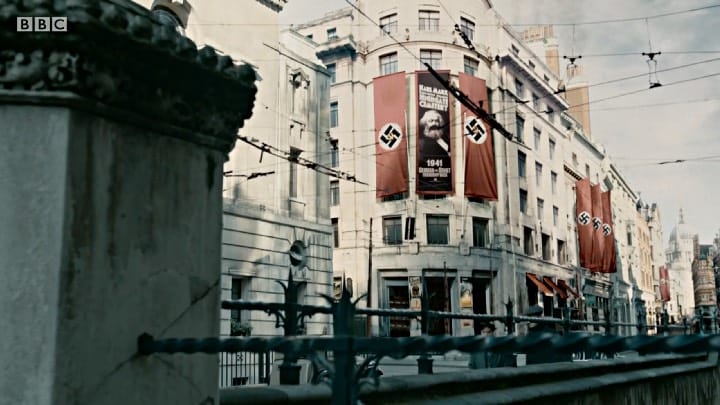SS-GB
I’ve just watched the first episode of SS-GB, the BBC’s new alternative-history drama based on Len Deighton’s novel. It’s fine, I’ll watch the next episode on Sunday night but, er, there’s a problem.

I mean come on.
In the plot, those banners are up to mark “German-Soviet Friendship Week”. Apparently in the novel, the Nazis also grant the Soviets bases in Britain. This I imagine all stands on top of the Nazi-Soviet non-aggression pact, transformed in the fiction into a close relationship.
What worries me is the depth of misunderstanding that allows someone to get even close to this point. After all, the focus is on the Nazis after they conquer Britain yet the understanding of Nazism is fatally flawed. Where else is this going to manifest itself in the story?
What does the man himself have to say?
the problem of how the future of the German nation can be secured is the problem of how Marxism can be exterminated
(Lines 6587 & 6588 of the Gutenberg Australia version of Mein Kampf.)
Nazism in great part succeeded in Germany due to an alliance with wealthy reactionary sectors, who backed the fascists in the face of a threat from socialists who would have expropriated them materially and politically.
To suggest there could be a lasting, strong and cordial alliance between the two is absurd, no matter what you think about the state of socialism in the Soviet Union.
And none of this even touches on the virulent Nazi hatred of the Slavs!
This is dangerous stuff. An understanding of fascism is absolutely vital if we’re to have any chance of confronting and stopping it — and we must always be ready to confront and stop it, whether it’s some “blood swastika pillock” or someone in a suit and tie.
And, frankly, it is a disgusting slur against the Soviet Union, whose people paid the highest price for defeating fascism in Europe.
(The BBC are also currently repeating The Nazis: A Warning from History, for which Ian Kershaw was the historical consultant. The first episode’s online for about another week.)